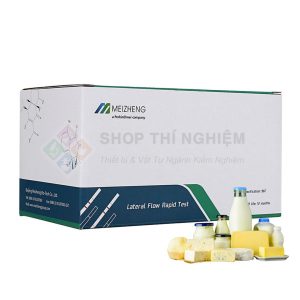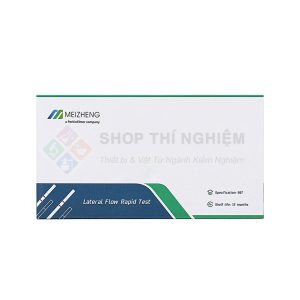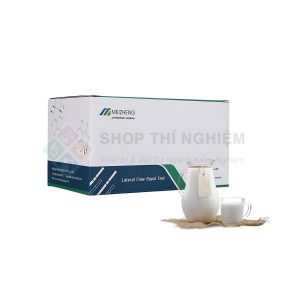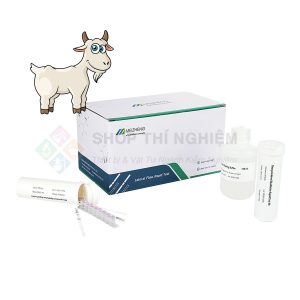Description
1. Overview:
VB12, or cobalamin, is one of eight B vitamins, It is important in the normal functioning of the nervous system via its role in the synthesis of myelin, and in the maturation of red blood cells in the bone marrow.
2. Principle:
The basis of the measurement is the antigen-antibody reaction. Antibodies are connected to the column and the VB12 in the sample is extracted, filtered, and diluted, and then passed slowly through the immunoaffinity column. The VB12 bind to the antibodies in the column and the immunoaffinity column is then washed to remove other unrelated substances that have not been bound. VB12 is then eluted with methanol and injected into an analytical instrument for detection.
3. Components of the kit:
Each kit contains VB12 immunoaffinity columns and 1 instruction manual.
4. Necessary items not provided in the box:
4.1 Equipment
- HPLC/LC-MS/MS
- Nitrogen gas evaporator apparatus
- Nitrogen gas tank and pressure regulator
- Air-pressure controller bracket
- Air pump
- Balance with 0.01g readability
- High-speed freezing centrifuge (can be set to 4°C, 8,000 rpm)
- Centrifuge tube:50-mL
- Constant temperature incubator or water bath (can be set to 25–100℃)
- High-speed homogenizer (maximum speed> 10,000 r/ min) or shaker
- Ultrasonic cleaner
- Grinder
- pH meter (or pH test paper)
- Volumetric flask: 100 mL/50 mL
- Syringe: 10 mL/20 mL
- Homogenization flask (or 250-mL conical flask with pestle)
- Vials and tubes
- Syring:10mL/50mL
- Pipette: 1 mL and pipette tips
- Column holder and syringe connector plug (for use withimmunoaffinity columns)
4.2 Reagents
- Methanol (CH3OH): Chromatography Grade
- Acetonitrile (CH3CN): Chromatography Grade
- Sodium hydroxide (NaOH): Analytical Grade
- Potassium chloride (KCl): Analytical Grade
- Formic acid (HCOOH): Chromatography Grade
- Acetic Acid (CH3COOH): Analytical Grade
- Sodium acetate (CH3COONa): Analytical Grade
- Potassium cyanide (KCN): Analytical Grade
- Hydrogen chloride (HCl): Analytical Grade
- Trifluoroacetic acid (CF3COOH): Analytical Grade
- Pepsin
- Alpha-amylase
- Distilled or deionized water
5. Note:
- Allow the immunoaffinity column to return to room temperature (22 to 25°C) before use.
- The affinity column should be stored at 2 to 8°C, do not freeze.
- Dot use any expired immunoaffinity column.
- Column capacity:1000 ng, when the content of the VB12 in the sample divided by the dilution factor is higher than the column capacity, it is necessary to reduce the volume of the sample solution appropriately, and retest.
- The pH of the loading solution of the affinity column should be within the range of 6 to 8. If it deviates from this range, the pH should be adjusted with dilute hydrochloric acid or dilute sodium hydroxide.
- Sensitivity: To obtain the best column efficiency and quantification of the detection and analysis system, it is recommended to load samples containing 100ng-500ng of VB12 on the column. Do not load samples approaching or exceeding 1000ng of VB12.
- The VB12 immunoaffinity column is depending on gravity. No
- external pressure is applied during use, and the purification operation is completed by the gravity of the buffer and the sample. Recommended flow rate is 1.5-2 mL/min.
- WARNING: Potassium cyanide is toxic and carcinogenic; protective equipment such as gloves and masks should always be used during handling. Sodium hypochlorite solution can be added to the waste liquid, and then discharged after treatment
- Vessels and tools used to handle toxin solutions should be completely immersed in a sodium hypochlorite solution (4% v/v) overnight. A certain amount of sodium hydroxide can be appropriately added to this solution to ensure the alkaline environment of the solution. After 24 hours, use test paper for cyanide to detect.
- Keeping the solvent and mobile phase consistent with the instrument detection can eliminate the effect of solvent effects.






Reviews
There are no reviews yet.